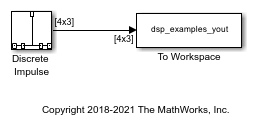Discrete Impulse
Generate discrete impulse
Libraries:
DSP System Toolbox /
Sources
Description
The Discrete Impulse block generates an impulse (the value
1) at output sample D+1, where you specify
D using the Delay parameter
(D ≥ 0). All output samples preceding and
following sample D+1 are zero.
When D is a length-N vector, the block generates
an M-by-N matrix output representing
N distinct channels, where you specify frame size
M using the Samples per frame parameter. The
impulse for the ith channel appears at sample
D(i)+1.
The Sample time parameter value, Ts, specifies the output signal sample period. The resulting frame period is MTs.
Examples
Ports
Output
Parameters
Block Characteristics
Data Types |
|
Direct Feedthrough |
|
Multidimensional Signals |
|
Variable-Size Signals |
|
Zero-Crossing Detection |
|
Extended Capabilities
Version History
Introduced before R2006a
See Also
Blocks
- Constant (Simulink) | Data Type Conversion (Simulink) | Multiphase Clock | N-Sample Enable | Signal From Workspace
